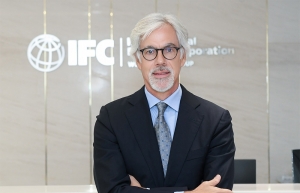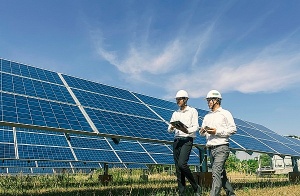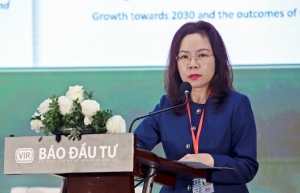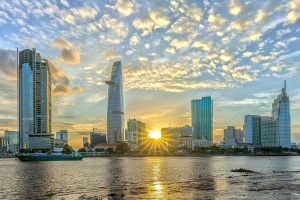Green policies and practices: catalyst or challenge
While global trade and investment have been key drivers of economic growth, they have also led to environmental degradation, including pollution and biodiversity loss. According to the World Trade Organization, trade activities contribute 20-30 per cent of global carbon emissions, exacerbating climate change. Although developed nations have adopted measures to reduce emissions, developing countries struggle with limited resources and historically looser environmental regulations
 |
| Prof. Peter Richard Draper |
Prof. Peter Richard Draper, executive director of the Institute for International Trade at the University of Adelaide, Australia, highlighted several trade policy challenges, including green industrial policies, sustainability due diligence, traditional tariffs, and geopolitical risks.
Draper noted that initiatives such as the Carbon Border Adjustment Mechanism (CBAM) and Net Zero targets are reshaping global supply chains. Advanced economies use tools such as financial grants and state loans—accounting for 25 per cent or more of green investment in these countries—to meet climate goals. He pointed out that climate policies represent 29 per cent of trade measures in advanced economies, indicating a growing emphasis on sustainability.
“Compliance with ethical supply chain standards is becoming a prerequisite for accessing public procurement contracts and avoiding penalties,” Draper said. He added that localisation requirements in public procurement often favour suppliers from compliant regions, creating barriers for developing nations.
Tariff changes due to geopolitical tensions, such as those between the United States and China, further complicate trade dynamics. Draper cited the example of US-China tariffs shifting demand for Australian wine and barley, and noted that such tensions also impact tech and defence small and medium-sized enterprises.
“For greening trade, it is difficult to predict how market regulations will evolve. Contradictory impulses and declining international cooperation make it challenging. While markets are driving green trade measures, things could easily worsen,” Draper said. He stressed the importance of vigilance and promoting trade measures that incentivise sustainable practices.
 |
| Prof. Andreas Freytag |
Prof. Andreas Freytag, director of Tutwa Europe Institute and professor at Friedrich-Schiller-University Jena, Germany, addressed the challenges posed by carbon leakage and the intersection of climate policy, development cooperation, and trade. He noted that these critical global challenges have not been sufficiently integrated into policymaking, even in forums like COP29.
“More trade means more development and a better climate. Conversely, less trade leads to less development and accelerated global warming,” Freytag said. He pointed to the success of carbon taxes and certificates as effective tools, in contrast to less efficient “command-and-control” measures, which are neither socially equitable nor cost-effective.
Freytag highlighted the systemic inequalities faced by developing nations in global trade policies, noting that industrialised countries often impose discriminatory measures while grappling with their internal and external divisions over trade policies.
“The declining division of labour leads to reduced wealth and diminished climate efforts,” he said, underscoring the interconnected nature of trade, development, and climate action.
While developing countries have contributed relatively little to cumulative greenhouse gas emissions, they are disproportionately affected by climate change. Freytag emphasised that these nations face severe consequences, including reduced productivity, rising inequality, environmental degradation, and increased risks of conflict and migration.
CIECI 2024 brought together international experts to explore the economic implications of green policies, digital transformation, and strategies for sustainable development. The conference featured six keynote presentations and multiple discussion sessions that examined how to integrate green policies with trade and adapt to global environmental standards such as the European Green Deal.
Experts also highlighted sector-specific insights, including green practices in agriculture, finance, tourism, and logistics. Discussions focused on innovative financial models and digital solutions to meet sustainability goals while maintaining economic growth.
 |
The conference underscored the need for developing countries to adopt adaptive strategies to align with global green standards. However, experts agreed that achieving this balance requires international cooperation, equitable policies, and access to resources to support sustainable development.
As nations continue to grapple with the dual challenges of economic growth and environmental sustainability, events like CIECI 2024 provide valuable roadmaps for addressing these global challenges, ensuring that trade and green policies act as catalysts rather than obstacles for developing economies.
 | Banking on banks to finance the green transition Vietnam’s green goals require huge sums in order for them to succeed. Thomas Jacobs, country manager for Vietnam, Cambodia, and Laos at the International Finance Corporation, looks at capacity-building measures and the hurdles that must be overcome. |
 | IFC’s record climate financing in Vietnam supports green transition Boosting its support for Vietnam's green transition and sustainable development, the International Finance Corporation (IFC) scaled up its long-term investment in the country with a strong focus on climate finance in the last fiscal year. |
 | Banking sector contributes to ESG, green growth, and sustainable development The banking sector has positioned itself as a pioneer in greening investment capital and enhancing social responsibility to achieve green growth and sustainable development goals. |
 | GGGI supports Vietcombank’s debut of $80 million green bonds Marking a milestone for Vietnam’s green bond market, Vietcombank has successfully issued VND2 trillion (approximately $80 million) of green bonds. |
What the stars mean:
★ Poor ★ ★ Promising ★★★ Good ★★★★ Very good ★★★★★ Exceptional
 Tag:
Tag:
Related Contents
Latest News
More News
- Trung Nam-Sideros River consortium wins bid for LNG venture (January 30, 2026 | 11:16)
- Vietnam moves towards market-based fuel management with E10 rollout (January 30, 2026 | 11:10)
- Envision Energy, REE Group partner on 128MW wind projects (January 30, 2026 | 10:58)
- Vingroup consults on carbon credits for electric vehicle charging network (January 28, 2026 | 11:04)
- Bac Ai Pumped Storage Hydropower Plant to enter peak construction phase (January 27, 2026 | 08:00)
- ASEAN could scale up sustainable aviation fuel by 2050 (January 24, 2026 | 10:19)
- 64,000 hectares of sea allocated for offshore wind surveys (January 22, 2026 | 20:23)
- EVN secures financing for Quang Trach II LNG power plant (January 17, 2026 | 15:55)
- PC1 teams up with DENZAI on regional wind projects (January 16, 2026 | 21:18)
- Innovation and ESG practices drive green transition in the digital era (January 16, 2026 | 16:51)



























 Mobile Version
Mobile Version